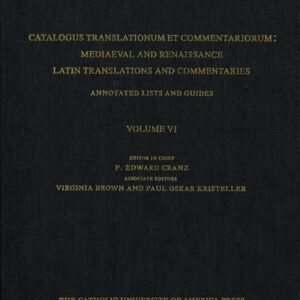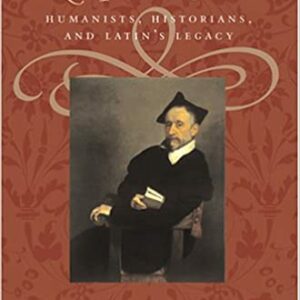
A Microfilm Corpus of the Indexes to Printed Catalogues of Latin Manuscripts before 1600 A.D. Based on P. O. Kristeller, Latin Manuscript Books before 1600.
Edited by F. Edward Cranz (NHC Fellow, 1981–82)

Edited by F. Edward Cranz (NHC Fellow, 1981–82)

Edited by F. Edward Cranz (NHC Fellow, 1981–82)

Edited by F. Edward Cranz (NHC Fellow, 1981–82), Paul Oskar Kristeller, Virginia Brown, and Robert A. Kaster The Catalogus Translationum et Commentariorum has become an indispensable research tool for scholars interested in the history of the classical tradition in the West during the Middle Ages and the Renaissance.

By Christopher S. Celenza (NHC Fellow, 2003–04) In The Lost Italian Renaissance, historian and literary scholar Christopher Celenza argues that serious interest in the intellectual life of Renaissance Italy can be reinvigorated—and the nature of the Renaissance itself reconceived—by recovering a major part of its intellectual and cultural activity that has been largely ignored since the … Continued

A single question changed the course of my life. When I first began studying Latin in 1996, it was a dead language, no doubt about it. It was pointless to try to speak it; everyone agreed the grammar was just too hard. Legend had it, though, that a single man—a priest, somewhere in Rome, Italy—could … Continued

I started learning Latin in seventh grade because I decided it was the most difficult course I could take, and I had something to prove. I was an economically disadvantaged student in a wealthy private school, and all of my classmates knew it. I would never live in their mansions, or wear their expensive clothes, … Continued

How has the study and teaching of classics been changed by the proliferation of digital tools? In this podcast, Michael Fontaine, professor of classics at Cornell University, and Skye Shirley, Latin teacher at Newton Country Day School in Newton, Massachusetts, discuss the remarkably diverse ways the information age has rejuvenated the study of Latin and Greek—altering the ways ancient languages are taught, expanding opportunities for learning, and fostering a robust network among scholars, teachers, and students.